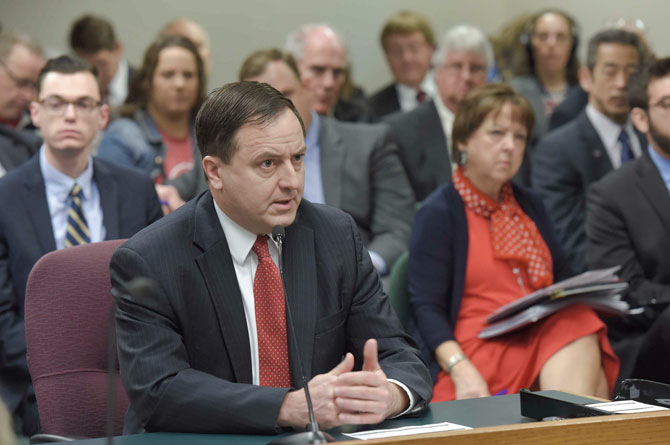Jay Ashcroft withdraws Missouri from group designed to help combat voter fraud

Missouri will no longer participate in a voluntary system aimed at helping states combat voter fraud by maintaining accurate lists of registered voters.
Secretary of State Jay Ashcroft announced Monday afternoon that Missouri, along with Florida and West Virginia, were withdrawing from the Electronic Registration Information Center, or ERIC.
The system was established in 2012 by a bipartisan group of election officials in seven states. It is designed to help identify and remove people from voter rolls who have died or moved to other states and prosecute people who vote in multiple states.
Thirty-two states and the District of Columbia are members.
In a letter to ERIC’s executive director, Ashcroft noted that Missouri joined five years ago “to make elections better, voter rolls more accurate and bring greater trust to the election process.”
Ashcroft cited several reasons pulling Missouri out of the group, including a requirement that member states send mailings to eligible but unregistered voters.
“ERIC focuses on adding names to voters rolls,” Ashcroft wrote, “by requiring a solicitation to individuals who already had an opportunity to register to vote and made the conscious decision not to be registered.”
Ashcroft questioned the value of the system for Missouri, writing that “only three of the eight states that border Missouri are members.” He also alleged ERIC “refuses to require member states to participate in addressing multi-state voter fraud.”
Missouri’s departure from ERIC is disappointing, said Boone County Clerk Brianna Lennon.
Over the last five years, Lennon said, Missouri voter rolls have gotten cleaner as a result of the membership in ERIC.
“While our statewide voter registration database allows us to update voter records if the voter moves or dies within Missouri, the benefit of ERIC was that it let us know if voters moved or died out of state,” she said. “Leaving ERIC weakens our voter roll clean up since we’ll no longer receive timely out-of-state information.”
Instead, Lennon said county election authorities will now once again have to rely on the “inefficiency of returned mail to update information.”
“Our elections are better when we can use every tool available to make the process more accurate and more efficient,” she said. “I’m disappointed we lost one of those tools today.”
The Associated Press reported last week that ERIC has faced increasing scrutiny of late, especially from allies of former President Donald Trump who worked to overturn the 2020 presidential election.
Among the complaints is that ERIC was founded with help from the nonpartisan Pew Charitable Trusts, which received money from liberal donor George Soros’ organization for a different project.
ERIC’s leadership told the AP that it is funded through annual dues by member states and has never received funding from Soros.
Critics have also complained about the involvement of David Becker, who helped found ERIC and now serves as a non-voting member of the group’s governing board while working for a nonprofit called Center for Election Innovation & Research.
When Louisiana’s secretary of state withdrew from the group, he claimed without evidence that Becker was sharing ERIC data with liberal groups.
Ashcroft didn’t name Becker in his letter, but did say a “hyper-partisan individual” serving as a non-voting member of the governing board was part of his motivation for pulling Missouri out of the group.
Greene County Clerk Shane Schoeller, who is running for secretary of state next year, also pointed to allegations of partisanship in the organization’s leadership as a reason to support Ashcroft’s decision to withdraw from ERIC.
“Simply put,” he said, “they do not have the trust of the people when they fail to demonstrate they are a nonpartisan organization.”
This story has been updated.








